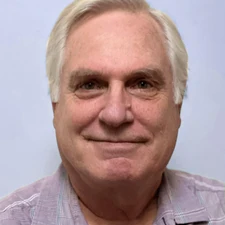David A. Lockner

The 2022 Louis Néel Medal is awarded to David A. Lockner for ground-breaking experimental contributions to understanding brittle rock failure, the frictional and transport properties of fault zones, and earthquake physics.
David Lockner began his rock physics career in 1974 when hired by the United States Geological Survey to build a laboratory system to study the processes controlling rock fracture and fault slip. He has remained at the USGS since, receiving his PhD from M.I.T. in 1990. For 48 years, Lockner has worked at the forefront of experimental research in his field. His expertise extends from rock fracture and seismic/aseismic fault slip, to transport properties, effects of hydrothermal and chemical processes, and many other aspects of rock and earthquake physics. His work is distinguished by pioneering solutions to key scientific questions, high productivity and high impact, with papers often accruing 200, 500 or even 1000 citations.
In his early years at the USGS, Lockner was amongst the first to establish experimental systems capable of tracking the rapid changes in rock properties and high frequency acoustic emissions (AE) that accompany brittle rock failure and fault motion. His ingenuity led to the first studies of quasi-static faulting using high frequency AE to control sample loading. Sample failure was thus controlled, so that the process could be recorded in detail, making use, for the first time, of AE inversion to probe the microstructural changes causing rock failure and fault localization. His methods now form the basis for statistical seismology where AE is used as an analog for studying natural seismicity and early warning signatures.
Beyond this, Lockner was amongst the first to investigate brittle creep and fault friction at true crustal conditions. He has played a pivotal, collaborative role in understanding the physical properties of rocks recovered from active fault drilling projects all over the world, and in understanding the low strength of the San Andreas and other major faults in terms of mineral composition and hydrologic properties. Lockner recognized the need for and designed one of the world’s first machines for studying fault friction at seismic slip velocities. Indeed, it is hard to find an area of current activity in the field where he has not made a fundamental, early contribution.
From his position at the USGS, Lockner has participated in countless international programmes. He has hosted, visited and advised Early Career geoscientists from China, Russia, Europe, Japan, Taiwan, the USA and beyond. Though a government scientist as opposed to university advisor, Lockner has mentored and steered many junior academics to build laboratories and become national and international leaders in the field, leaving a quiet, yet global legacy.
David Lockner’s extraordinary achievements in rock and fault physics, his role in pioneering new experimental methods and discoveries at every frontier of the field, and the impact he has made in international collaboration and in fostering the next generation of experimentalists worldwide, have placed him at the top of field. He will be recognized by all as a truly deserving Néel Medalist for 2022.
